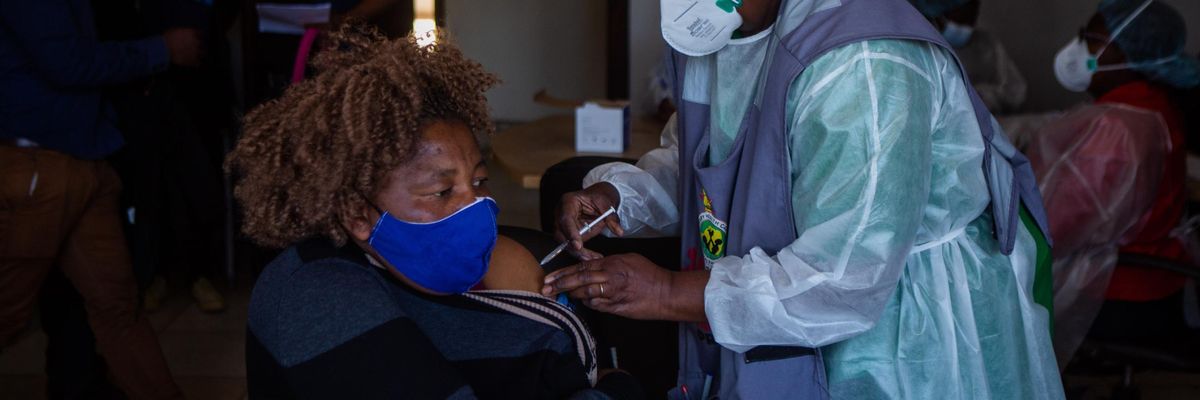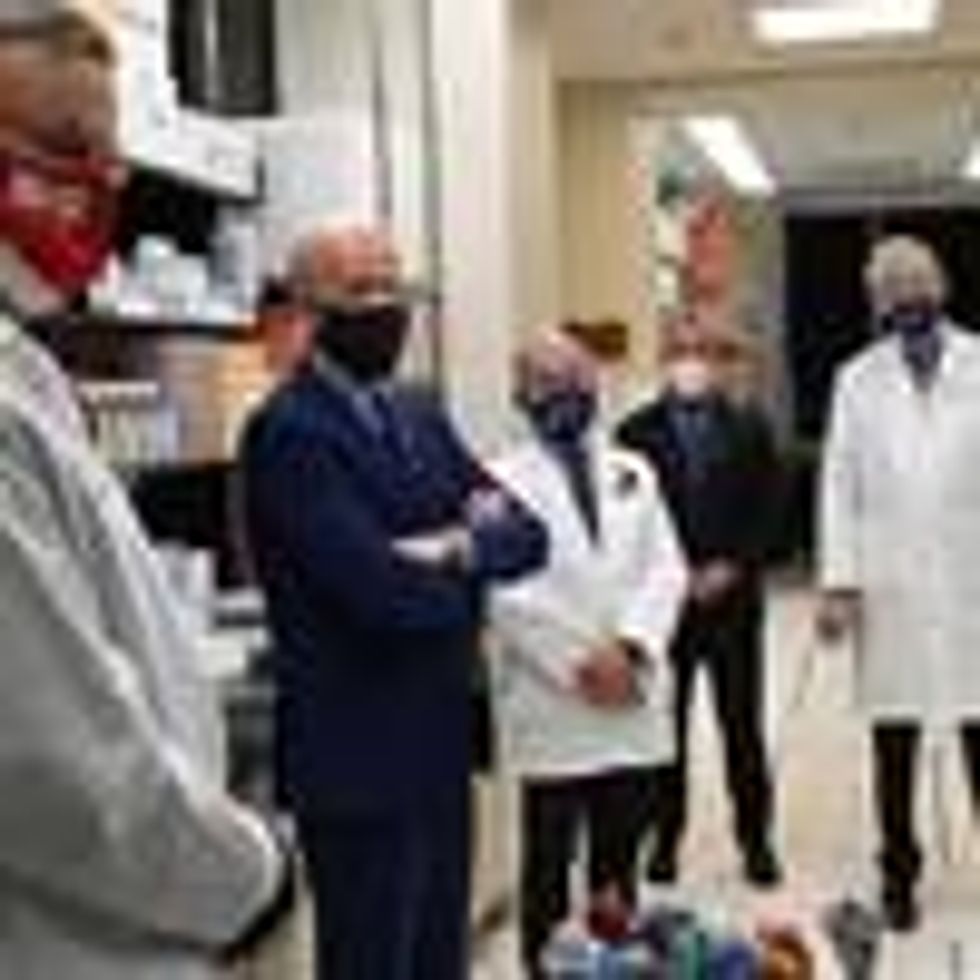Moderna's pledge Thursday to build a coronavirus vaccine factory in a yet-to-be-determined location in Africa at some unspecified point in the future was met with immediate skepticism from public health campaigners and analysts, who warned that the U.S.-based company's new announcement may be nothing more than a "PR gimmick."
"The U.S. government has the power to order Moderna to share this essential technology with WHO and the world."
That was the initial assessment offered by Medecins Sans Frontieres (MSF) Access Campaign communications director Shailly Gupta, who argued that Moderna's statement could be designed "to derail/stall discussions" on a patent waiver for coronavirus vaccines and "divert focus" from the World Health Organization's mRNA technology transfer initiative in South Africa.
Moderna has thus far refused to participate in the WHO's effort, which is intended to rapidly scale up vaccine production on the continent. Dr. Martin Friede, a vaccine research coordinator at the WHO, said last month that "all attempts" to get Moderna to take part in the organization's tech transfer hub "have resulted in no reply."
In a press release Thursday, Moderna said it intends to "build a state-of-the-art mRNA facility in Africa with the goal of producing up to 500 million doses of vaccines each year," including its two-dose coronavirus shot--which was developed with the help of billions of dollars in funding from the U.S. government.
"On behalf of our growing team, partners, and shareholders, we are determined to extend Moderna's societal impact through the investment in a state-of-the-art mRNA manufacturing facility in Africa," said Moderna's billionaire CEO Stephane Bancel, who offered no specifics on when or where the proposed facility will be built.
Dr. John Nkengasong, director of the Africa Centres for Disease Control and Prevention, toldReuters on Thursday that Moderna did not consult with him before making its announcement.
The Massachusetts-based pharmaceutical company's statement came as it continues to draw criticism for selling the overwhelming majority of its vaccine supply to rich nations while refusing to share doses or key technology with struggling poor countries.To date, according to Nkengasong, just 4.5% of Africa's 1.3 billion-strong population has been fully vaccinated against Covid-19.
"Pledging to build a plant in the future cannot excuse Moderna's failure to share knowledge or adequate doses today," Peter Maybarduk, director of the Access to Medicines program at the U.S.-based advocacy group Public Citizen, said in a statement Thursday. "The world would be far better served if instead Moderna cooperated with the WHO and South Africa to accelerate the development of the world's first mRNA hub, which already is underway and is intended as a learning facility for manufacturers worldwide."
"Moderna holds secret a vaccine recipe that humanity needs; a vaccine pioneered significantly by public science and developed in large part by billions in public money," Maybarduk continued. "From indications, Moderna may control its African plant much as it controls the vaccine now; with commitment to monopoly power. Moderna gives no indication of technology transfer, and meanwhile, is overcharging African nations for its vaccine."
Maybarduk stressed that given the amount of public funding that went into the development of the Moderna shot, "this is not only Moderna's vaccine."
"It's the [National Institutes of Health]-Moderna vaccine; the people's vaccine," he said. "And the U.S. government has the power to order Moderna to share this essential technology with [the] WHO and the world."
Related Content
NIH Scientist Who Developed Key Vaccine Technology Says Patent Gives US Leverage Over Big Pharma
Jake Johnson
But the Biden administration has thus far declined to use its leverage to compel Moderna to share its vaccine recipe with qualified manufacturers in Africa and other regions.
Instead, as Politico reported Thursday, White House officials have "urged Moderna for months to increase its production domestically, in an attempt to help deliver on the president's pledge to make the U.S. 'an arsenal of vaccines' for the world."
"The U.S. government co-invented the vaccine."
"Moderna, which developed its shot with scientific and financial help from the government, has shied away making additional commitments," Politico noted. "The company has cited worries about its ability to balance its domestic and international responsibilities. But administration officials privately believe the reluctance is also driven in part by financial concerns: If Moderna agreed to sell the Biden administration doses for poorer countries it would likely be asked to do so at cost... putting pressure on its bottom line."
One unnamed administration official told the outlet that the U.S. has spent $8 billion on the development of the Moderna vaccine.
"The U.S. government co-invented the vaccine," the official said.
According to a report released last month by Amnesty International, Moderna "has not yet delivered a single vaccine dose to a low-income country, has provided just 12% of its vaccines to lower-middle-income countries, and will not deliver the vast majority of its orders for COVAX until 2022."
"Higher prices mean it is set to earn over $47 billion in revenues by the end of 2022," Amnesty estimated.
Moderna's coronavirus vaccine profits have propelled two of its founders and one early investor to the Forbes 400 list of the wealthiest Americans as billions of people across the globe remain without access to the lifesaving shot. On average, more than 7,700 people worldwide are dying each day from the coronavirus, according to the latest figures from Johns Hopkins University.
The Washington Postreported Thursday that Moderna's proposed vaccine factory in Africa "will not have an immediate impact on the coronavirus pandemic because it will take two to four years to build."
Lawrence Gostin, a global health law expert at Georgetown University, told the Post that "opening up manufacturing plants in other countries is certainly a step forward, but it doesn't really change the dynamic" of massive inequities in vaccine distribution.
"There's this monopolistic grip of a few countries that really controls the narrative, and the availability and the access of lifesaving medical resources--and there's enormous global resentment about that," said Gostin. "It's helpful to have the shiny hospital or the shiny manufacturing plant or the shiny clinic, but what you really want is to have the infrastructure that belongs to the country, with trained, capable people running that infrastructure."


